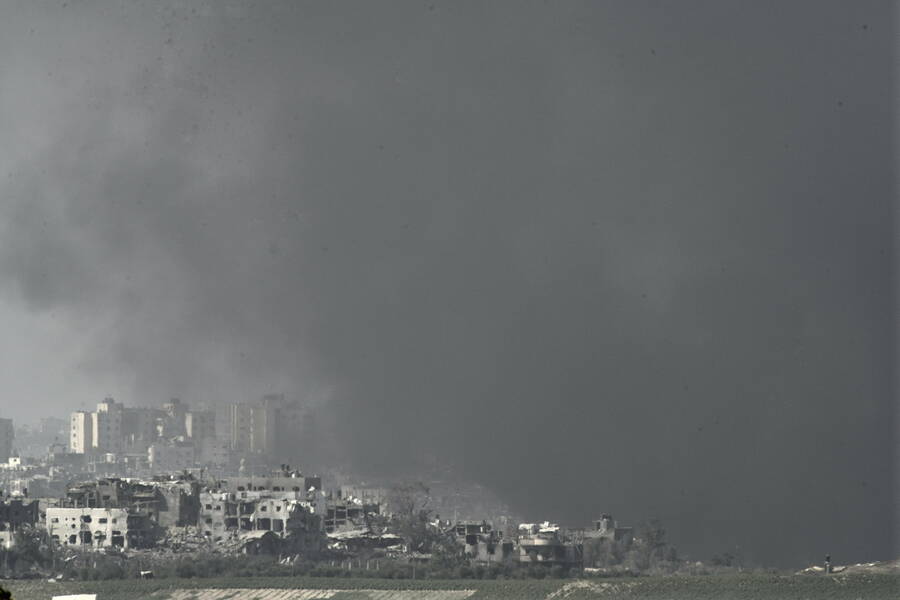[…]

Smoke rises from buildings demolished by Israeli Air Force airstrikes in northern Gaza on October 26th, 2023.
On the wall of my childhood Hebrew school classroom, there was a poster with the early Zionist slogan A land without a people for a people without a land. At the time I didn’t see that this alluring chiasmus not only presented a straightforward lie, but also contained a brutal theory of time: It makes a claim about the present in order to herald a desired future, binding both into a single point of erasure. I am sent back to this early encounter with language’s violent enclosures as I sit with the opening lines of Fady Joudah’s poem “[…].” What at first seems like a disruption of the regimented colonial grammar through the syntax of contradiction—“They did not mean to kill the children. / They meant to”—is actually, I soon realize, a record of the same cruel totality prescribed by the chiasmus. After all, despite the superficial contestation, the children are killed nonetheless.
This is not to say that desire doesn’t matter. Joudah repeatedly surfaces the fantasies animating the colonial reality that presents itself as simply inevitable: “They wanted to save them from future sins”; “They wanted to lead / their own study”; “This is what the bomb-droppers / did not know they wanted: / to see if others will be like them / after unquantifiable suffering.” By naming these aspirations, the poem disallows language from giving cover to the agents of violence, who present their conquest as history’s natural trajectory. Desire inherently disrupts the disciplinary march of imperial time; desire returns, it fixates, it refuses to move on. In its final line, the poem calls up a new genealogy, which has been there all along. Agitated by desire, the present—revealed to be not an immovable fact but the knot of history’s dreams—is newly consecrated as a terrain of struggle.
– Claire Schwartz
[…]
They did not mean to kill the children. They meant to. Too many kids got in the way of precisely imprecise one-ton bombs dropped a thousand and one times over the children’s nights. They will not forgive the children this sin. They wanted to save them from future sins. Or send them wrapped lifetimes of reconstructive surgical hours pro bono, mental anguish to pass down to their offspring. Will the children have offspring? This is what the bomb-droppers did not know they wanted: to see if others will be like them after unquantifiable suffering. They wanted to lead their own study, but forgot that not all suffering worships power after survival. What childhood does a destroyed childhood beget? My parents showed me the way.
Fady Joudah is the author of six poetry collections, including, most recently, [...] (Milkweed Press), which was composed during the first three months of the war on Gaza in 2023.